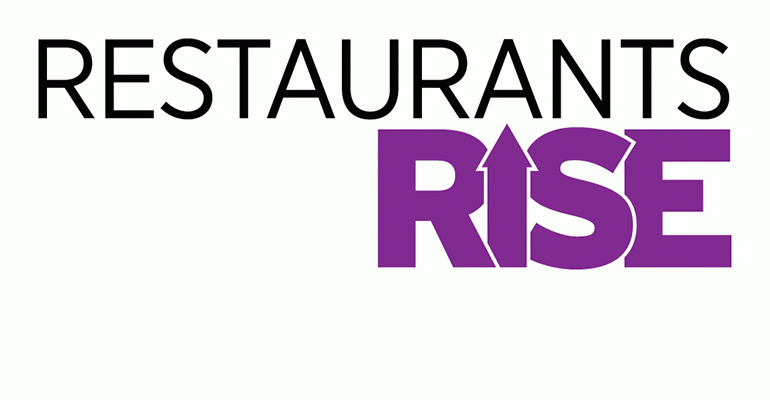Early investments in being “employee focused” has helped &Pizza weather the pandemic with about 90% of workers employed, 85% of the 50-unit chain’s restaurants open and “putting up a fair amount of profit,” said CEO Michael Lastoria on Friday.
 Tender Greens tapped its solid relationships with farmers and other foodservice businesses and had success offering grocery boxes — selling some 20,000 at the height of the shutdown, said CEO Denyelle Bruno, left.
Tender Greens tapped its solid relationships with farmers and other foodservice businesses and had success offering grocery boxes — selling some 20,000 at the height of the shutdown, said CEO Denyelle Bruno, left.
Brinker International, parent to more than 1,250 Chili’s Grill & Bar and Maggiano’s Little Italy, said developing solid general managers paid off, building a team of community leaders that could “stand on their personal reputations and management styles and sense of belonging,” said Rick Badgley, chief people and administrative officer.
The three executives shared their strategies on a panel titled “Power & Purpose: A Leadership Panel,” as part of the Restaurants Rise digital summit.
 Lastoria, left, said &Pizza benefited from being “digital first” long before the pandemic, leaning in as guests increasingly shifted to digital ordering.
Lastoria, left, said &Pizza benefited from being “digital first” long before the pandemic, leaning in as guests increasingly shifted to digital ordering.
But Lastoria also credited early moves to invest in “tribe members,” as &Pizza calls its workers. In mid-March, as states began to shut down dine-in service, Lastoria said the company made the commitment to increase wages across the board as an incentive to encourage workers to show up.
&Pizza also partnered with the ride-sharing company Lyft to provide affordable effective transportation to work, extended sick pay and launched a campaign to serve pizzas to hospitals, which gave workers an opportunity to feel they were doing something important for the health of their communities.
“Those things combined allowed us to keep over 90% of our workforce employed through this, including in corporate, which we call support, and it’s been really healthy, at least for our brand. The most important thing to grow out of this: you need a workforce that feels appreciated, motivated and encouraged to show up and do the right thing and to want to help lift up this company,” he said.
Bruno agreed that making that kind of investment in workforce culture can help keep team members loyal and connected through a crisis.
“If you’re waiting for a crisis to do the kinds of things you need to do to make sure you have loyal employees and that people feel committed … if you’re waiting for those opportunities to show your people you care or your commitment, you’re going to fall short,” she said.
“I have spent my career focusing on employees, and even to the chagrin of people I’ve worked for on occasion,” she added. “Focusing on the guest to me is secondary because I think if you’re making a great product and if you’re really supporting and developing and training and listening to your team members, they’re going to carry the brand.”
All three executives shared how their respective companies addressed the unrest following the death of George Floyd at the hand of Minneapolis police officers. &Pizza offered workers three days’ paid time off for activism. Tender Greens is expected to launch a new program bringing fresh food to those in need in South Los Angeles, and Brinker will continue to emphasize diversity and how restaurants can serve underserved communities.
Despite the challenge of the pandemic and weeks of protests, all three chains said they see opportunities for growth ahead.
“Some will be for sad reasons and some will be because some brands weren’t relevant going into this,” said Bruno. “For those that have the capital and the product to succeed in the new world, there will be opportunities.”
 Badgley, left, agreed, saying Brinker has a dozen or so restaurants in the development pipeline.
Badgley, left, agreed, saying Brinker has a dozen or so restaurants in the development pipeline.
“We’re not running out the door, as we all know capital is a bit tighter,” he added. “But there are certain markets, we’re hearing from both brokers and others, that it could be an opportunistic time to look at some growth avenues while still balancing the fiduciary back to shareholders and what your capital constraints are. But we’re optimistic.”
This is part of special coverage of the Restaurants Rise digital summit, powered by Nation’s Restaurant News and Restaurant Hospitality. Register for on-demand replays at RestaurantsRise.com. Title sponsors include DoorDash, Pork Checkoff and True Aussie Beef & Lamb. A portion of proceeds from this event will help support the Restaurant Employee Relief Fund from the National Restaurant Association Educational Foundation.
Contact Lisa Jennings at [email protected]
Follow her on Twitter: @livetodineout





